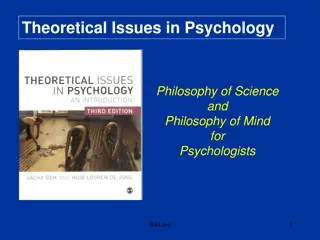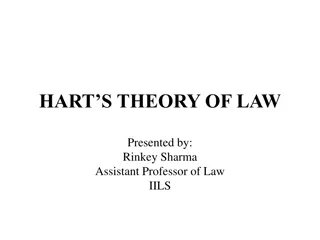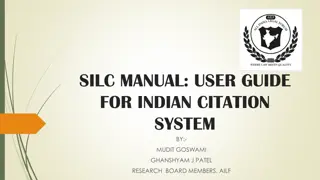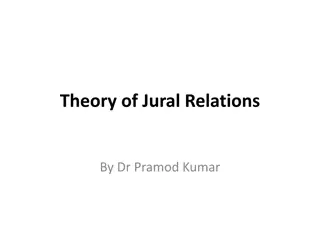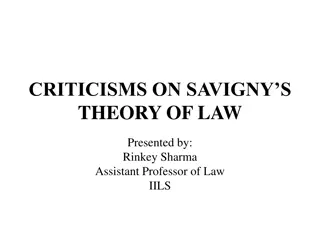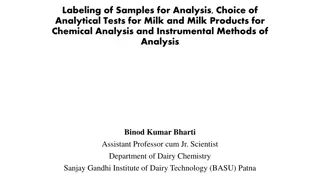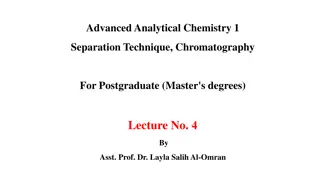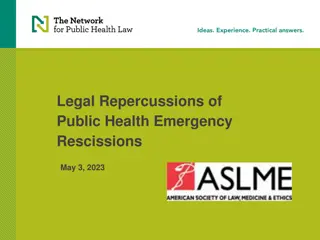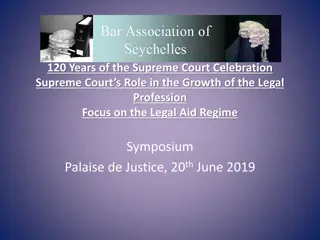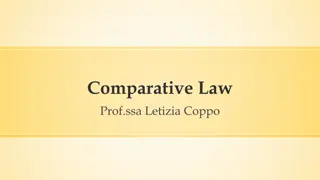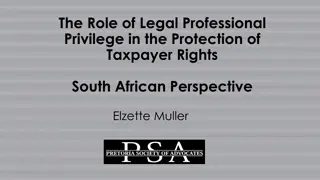Overview of Analytical Positivism in Legal Theory
The Analytical Positivism school, also known as the Austinian school, emphasizes a sharp separation between law and morality. It views law as a command and emphasizes the importance of law as it is, rather than how it ought to be. This approach, championed by thinkers like John Austin and Jeremy Bentham, gained prominence in the nineteenth century. However, critics argue that the total separation of law and morality may not be sustainable in all contexts, leading to the emergence of alternative legal theories.
Download Presentation

Please find below an Image/Link to download the presentation.
The content on the website is provided AS IS for your information and personal use only. It may not be sold, licensed, or shared on other websites without obtaining consent from the author. Download presentation by click this link. If you encounter any issues during the download, it is possible that the publisher has removed the file from their server.
E N D
Presentation Transcript
Analytical Positivism By Dr Pramod Kumar
Introduction Analytical school is also known as the Austinian school since this approach is established by John Austin. It is also called as an imperative school because it treats law as the command of the sovereign. Dias terms this approach as Positivism as the subject- matter of the school is positive law. The analytical school gained prominence in the nineteenth century. The distinctive feature of eighteenth-century juristic thought was Reason. Individualism became the manifestation of the cult of reason. Writers like Descartes, Locke, Rousseau, Kant advocated Reason as the last guide and judge in everything.
Introduction Bentham breaks away from the spirit of the eighteenth century, rejects natural law and subjective values and emphasizes utility and propounds the concept of expository jurisprudence which deals with the law as it is. Expository jurisprudence deals with the scholarly exposition of the contents of an actual legal system as it now exists or once existed. It is also known as systematic jurisprudence. Austin takes over tins concept of expository jurisprudence and subjects it to a far more detailed, thorough and searching analysis. Allen has pointed out that Austin does not revolt against 18th- century individualism but seems to be quite impervious to it. His approach was secular, positivistic and empirical. It was Austin who propounded the theory of positive law, the foundation of which was laid by Bentham.
Analytical Positivism Meaning of Positivism: It is the concept which sharply separates law and morality and which contrasts the natural law theory. The positivists argue that the theories of morality, religion, justice, and equality differ from law and should play in no role in the interpretation or application of legislation. Thus, they concluded that as wrong as written law has been duly enacted by a branch of government it must be deemed valid and binding regardless of whether it offends anyone s sense of right or wrong. Positivism theory was based on two values: Law must be a command. It cubes judicial discretion which means in some cases judges are not satisfied with the outcome of a case but they have to dictate the narrow reading of existing laws. So, positivism reflects the decisions which are given only on the basis of existing laws and in this concept of law as it is was most important rather than the law ought to be .
Analytical Positivism On the basis of this separation of law and morality, this theory was criticized by various jurists and this total separation of law as it is and ought to be cannot be maintained. Through the chief defect in the above theory, so many other theories came into existence like historical law school which regards custom as a source of law and other like Neo-Austin theory which regards general will as the sources of law and others. So, at the conclusion, we can say that positivism flourished best only in the stable conditions of society, but for developing eras, the intellectual relations of existing law and morality is essential.
Exponents of Analytical School The prominent exponents of this school are Bentham, Austin, Holland, Salmond, Kelsen, Gray, Hoffield and Hart. Bentham Jeremy Bentham can be said to be the founder of the Analytical school. In one of his books, he rejected the clinches of natural law and expounded the principle of utility with scientific precision. He divided jurisprudence into expository and censorial. The former deals with the law as it is while the latter deals with the law as it ought to be. Bentham s jurisprudence is indicative of the fact that the impact of natural law had not completely disappeared that s why he talked of utility as the governing rule. Perhaps, because of this reason, Bentham is not styled as the father of analytical school. He, however, believes that law is a product of state and sovereign. analysis of censorial
Exponents of Analytical School Bentham Bentham s concept of law is an imperative one for which he himself preferred the term mandate . He also propounded the theory of utilitarianism. According to this theory, the proper end of every law is the promotion of the greatest happiness of the greatest numbers, or in other words, the right aim of legislation is the carrying out of the principle of utility. Bentham rejected natural rights and recognised no limitations on Parliamentary sovereignty.
Exponents of Analytical School Austin In 1832, John Austin s lectures were published under the title of the Province of Jurisprudence Determined . This was the first systematic and comprehensive treatment on the subject which expounded the analytical positivist approach and as a result of this work, Austin is known as the father of the Analytical School. He limited the scope of jurisprudence and prescribed its boundaries. His approach was analytical. Austin built on the foundation of expository jurisprudence laid by Bentham and did not concern himself with extra-legal norms. He distinguished between the science of legislation and law from morals. To Austin, jurisprudence meant the formal analysis of legal conceptions. He divides jurisprudence into general jurisprudence and particular jurisprudence. Austin took a legal system as it is that is positive law and resolved it into its fundamental conception.
Exponents of Analytical School Austin Positive law is the outcome of state and sovereign and is different from positive morality. The great contrast between positive law and positive morality, according to Austin, is that the former is set by a political superior whereas the latter is not the offspring of state and sovereign, hence it is not law. Law cannot be defined by reference to any idea of justice. The science of jurisprudence is only concerned with the positive laws. According to Austin, analysis of positive law is to be done by the operation of logic on the law without consideration of the history of ethical significance. Austin ignored social factors as well as in his analysis of law, he emphasized that by the operation of logic, it is impossible to find out the universal elements in law, for example, notions were common in all mature legal systems. Austin s approach, analysis and deduction are, however, applicable to a unitary polity based on parliamentary sovereignty. It does not have that relevance to legal systems as in India and the United States of America.
Exponents of Analytical School Holland Holland is another supporter of the analytical school. He is the follower of Austin. However, he differs from Austin as to the interpretation of the term positive law. For him, all laws are of not the command of sovereign, rather, he defines law as rules of external human action sovereign political authority. enforced by a
Exponents of Analytical School Salmond Salmond also belongs to the analytical school but differs from his predecessors in a number of ways. These are : 1.He gives up the attempt to find the universal elements in law by defining jurisprudence as science of civil law. According to him, there is nothing like universal element in law because it is the science of law of the land and is thus conditioned by factors which prevail in a particular state. 2. He deals with law as it is but the law to him is to be defined not in terms of the sovereign but in terms of courts. Law is something which emanates from courts only. 3. He did not agree with Austin that analysis of law can be done with the help of logic alone. He points out that the study of jurisprudence which ignores ethical and historical aspects will become a barren study.
Principles of analytical School 1. Difference between law as it is and law as ought to be This is a trait of all positivism thinkers for example, Bentham s Law and Morals have same course but different circumference. Austin does not deny that moral factors work in the creation of law, however, he does not allow any place to morals in his theory. To him, positive law carries its own standard itself. This approach has been criticized by Dias, Hughes, Paton, Stone, Fuller, etc. 2. Concentration of positive law Analytical jurists look exclusively at the positive law. They prefer to be concerned only with what is the pure fact of law. Representing to themselves the whole body of legal precepts that obtain in a given system as made at one stroke on a logical plan to which they conform in every detail, the analytical jurists set out to discover the plan by analysis.
Tenets of analytical School 3. Law in terms of and a product of State Analytical jurist regards law as something made consciously by lawmakers, whether legislative or judicial. They emphasize not the way in which the precepts originate with respect to their content but the fact that they get the conscious stamp of the authority of the state. Thus the most important fact is establishment or authoritative recognition by the state, of a rule of law. In this sense law is a product of conscious and increasingly determinate human will. 4. Logic For studying law, analytical jurist have mainly taken resort of logic and rejected ethical elements. There is no value of historical or social factors for jurists of analytical school. 5. Statute Law is that which is made consciously by the state. Statute law is the main concern of the school.
Kelsons pure theory of law Basic norm (German: Grundnorm) is a concept in the Pure Theory of Law created by Hans Kelsen, a jurist and legal philosopher. Kelsen used this word to denote the basic norm, order, or rule that forms an underlying basis for a legal system. The theory is based on a need to find a point of origin for all law, on which basic law and the constitution can gain their legitimacy (akin to the concept of first principles). The pure theory of law implies that law must remain free from Social Sciences like psychology, sociology or social history. Kelson s aim was to establish a science of law which will be pure in the sense that it will strictly eschew all metaphysical, ethical, moral, psychological and sociological elements. His aim goes beyond establishing an autonomous legal science on positivistic empirical foundations, as he constantly criticized the ideas of justice and the principles of natural law. He altogether excludes all such factors from the study of law.
Kelsons pure theory of law Kelson defines law as an order of human behaviour. The specific nature of this order consists 1. In its being coercive and 2. The fact that this coercive power is derived solely from the sanction attracted to the law itself. His sole object was to determine what can be theoretically known about the law of any kind at anytime under any conditions.
Kelsons pure theory of law The essential foundations of Kelson s system may be summarised as under : 1. The aim of theory of law as of any science is to reduce chaos and multiplicity and to bring unity. 2. Legal theory is science not volition. It is knowledge of what law is, not of what the law ought to be. 3. Law is a normative not a natural science. 4. Legal theory is a theory of norms. It is not concerned with the effectiveness of legal order. 5. A theory of law is formal, of the way of ordering changing contents in a specific way. 6. The relations of legal theory to a particular system of positive law is that of possible to actual law.
Kelsons pure theory of law The most distinguishing feature of Kelson s theory is the idea of norms. To Kelson, jurisprudence is a knowledge of a hierarchy of norms. A norm is simply a preposition in hypothetical form. Jurisprudence consists of the examination of the nature and Organisation of such normative proportions. It includes all norms created in the process of applying some general norm to a specific action. According to Kelson, a dynamic system is one in which fresh norms are constantly being created on the authority of an original or basic norm, while a static system is one which is at rest in that the basic norm determines the content of those derived from it in addition to imparting validity to them.
Criticism Kelsons pure theory Kelson s pure theory of law has been criticized by jurists. The main criticisms are as follows : 1. His conception of Grundnorm is vague. Friedman puts it, it is a fiction incapable of being traced in legal reality. Kelson seems to have given his thesis on the basis of the written constitution but even in the written constitution Grundnorm is made up of many elements and any one of these elements alone cannot have the title of Grundnorm. 2. Every rule of law or norm derives its efficacy from some other rule or norm standing behind it but the grundnorm has no rule or norm behind it. A grundnorm derives its efficacy from the fact of its minimum effectiveness. 3. Another important objection of Kelson s theory is that he has not given any criterion by which the minimum of effectiveness is to be measured. Writers like Friedman, Stone, Stammer have pointed out that in whatever way the effectiveness is measured, Kelson s theory has ceased to be pure on this. The minimum of effectiveness cannot be proved except by an enquiry into political and social facts whereas Kelson has altogether rejected political and social facts.



